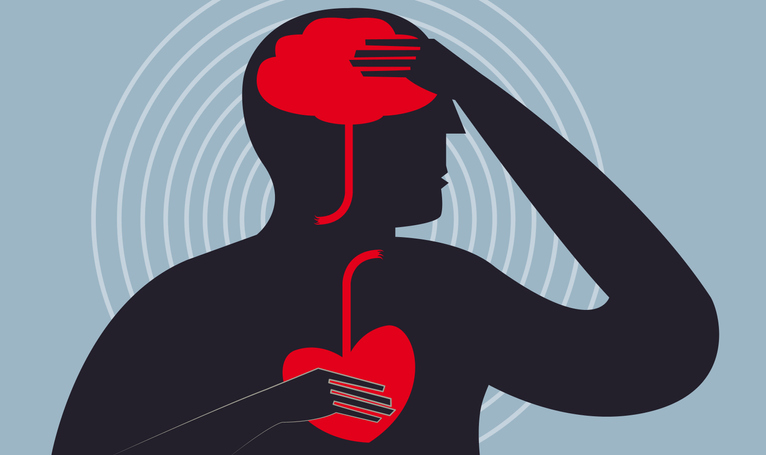Healthy Heart, Healthy Mind

If you are an emotional or sensitive person, people may tell you: “Think with your head, not your heart.”
And when it comes to your health, it appears that you may want to think with and about your head and heart.
According to a recent study published in the American College of Cardiology, people who are at a higher risk of developing cardiovascular disease are also at a higher risk of having increased cognitive decline. This includes “...an increase in typical markers of Alzheimer’s disease, suggesting that monitoring and controlling for heart disease may be key to maintaining and improving cognitive health later in life.”

The study involved 1,588 people who did not have dementia (average age of the participants was 79.5 years). These participants were followed for 21 years. At baseline, they were categorized into groups of lowest, middle and highest for being at risk for heart disease.
“At the end of the study period, researchers found that having a higher cardiovascular risk burden was associated with faster decline in episodic memory, working memory and perceptual speed.”
Furthermore, the results always revealed evidence which showed that heart disease was connected to “...smaller volumes of hippocampus, cortical gray matter and total brain. Decreases in hippocampal and gray matter are typical markers of Alzheimer’s dementia-related neurodegeneration. MRIs also showed a greater volume of white matter hyperintensities, which are white spots on the brain that cause an area to decline in functionality.”
So it appeared that heart disease was connected to actual brain shrinkage! This is all something we need to take seriously and wholeheartedly (pun intended). Heart disease is the leading cause of death for both men and women in the United States. In addition to this, a recent study conducted by the Centers for Disease Control and Prevention (CDC) predicts that the U.S. burden of Alzheimer’s disease and related dementias (ADRD) will double by 2060.
Diet is definitely a factor within our control. You likely already know that unhealthy foods, junk foods (also called ultra-processed foods), may increase your risk of heart disease (and, therefore, cognitive decline). But I think it is extremely important to really educate yourself about exactly what you are putting into your body and what impact this can have.
And one thing to really watch out for is trans fats. Not all fats are bad. Fats are one of the six basic nutrients you need to live. The others are protein, water, carbohydrates, vitamins and minerals.
But not all fats are good.
“The worst type of dietary fat is the kind known as trans fat. It is a byproduct of a process called hydrogenation that is used to turn healthy oils into solids and to prevent them from becoming rancid,” reports Harvard Health.
Foods like cookies, crackers, muffins, pies, frozen pizza, french fries and stick margarines are examples of foods that contain trans fats. Keep in mind that small amounts of trans fats do naturally occur in some foods, like meat and dairy products. The real culprit, however, is in ultra-processed foods.
Trans fats are particularly dangerous for the heart and may pose a risk for certain cancers. Consuming trans fat increases low-density lipoprotein (LDL, or "bad") cholesterol. This risk factor contributes to the leading cause of death in the U.S, namely coronary heart disease. It’s also associated with a higher risk of developing Type 2 diabetes.
Metabolic syndrome (which health issues such as obesity, diabetes, hypertension and more fall under) is basically very common in Americans and increases the risk of heart disease and in the long run it appears dementia.
Fat is a big part of our diets, but we want to make sure we are eating the right types of fats.
Go for unsaturated fats such as nuts, olive oil and avocados. Steer clear of ultra-processed foods as much as possible.
You can also protect your brain and heart health by exercising regularly, avoiding smoking, drinking alcohol in moderation (if at all) and getting good, quality sleep.
When it comes to overall health and wellness, think of both your head and heart.
Enjoy your healthy life!
The pH professional health care team includes recognized experts from a variety of health care and related disciplines, including physicians, attorneys, nutritionists, nurses and certified fitness instructors. This team also includes the members of the pH Medical Advisory Board, which constantly monitors all pH programs, products and services. To learn more about the pH Medical Advisory Board, click here.







